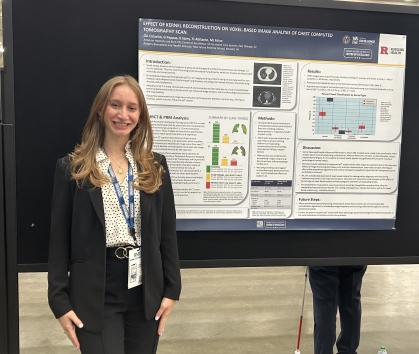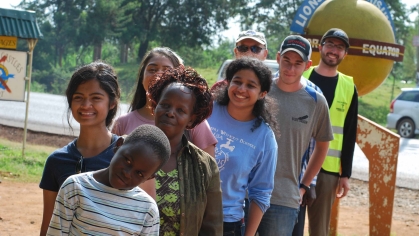BME Senior Olivia Colavito Presents at BMES Annual Meeting
BME Senior Olivia Colavito Presents at BMES Annual Meeting
Senior biomedical engineering (BME) major Olivia Colavito’s grandfather Michael Quartana served for two years as a combat medic -- although he never saw combat -- in Ethiopia in the late 1950s.
Inspired by his service, Colavito has focused her research efforts on veteran healthcare issues. “Every year my grandpa wears an army hat on Veterans Day, which is something he’s always been proud of,” she says. “That interested me in wanting to work with the veteran population.”
She has done this first through a research internship with the U.S. Department of Veterans Affairs and its Airborne Hazards and Burn Pits Center of Excellence in East Orange, N.J, where she participated in a project led by Dr. Michael Falvo using artificial intelligence (AI) to analyze CT scan data from vets’ lungs, and which she presented at the BMES’ annual meeting in Baltimore this past October.
Currently, she is working with PI Dr. Daniel Wilhite to help to set up a new Applied Pulmonary Physiology lab at the VA office. She will receive academic credit for her efforts from the School of Engineering’s James J. Slade Scholars Program, which supports undergraduate research and thesis projects. The new lab, she says, will “eventually test the cardiac output of vets.”

Developing a Presentation
Maribel Vazquez, a professor in the Department of Biomedical Engineering encouraged Colavito to submit an abstract, with the help of her VA team, to present at the BMES meeting.
“I worked with the team to develop my poster.,” she recalls. For Colavito, the experience was especially rewarding, not only because she gained high-level presentation experience but because she had the opportunity not only to meet students and biomedical engineers from other schools but also see what BME researchers from around the nation were doing.
Colavito is quick to insist that she did not develop the AI algorithm used for the VA project, but rather used software to analyze the data from the CT scans.
“When I was getting outputs, I kept getting an error from some scans and brought this to the attention of the project PI,” she recollects. “We investigated and realized that different brands of scanners set different CT parameters. Pinpointing this problem was a significant finding to us, as we need to figure out how to compare data if it hasn’t been classified the same way.”
According to Colavito, other researchers have encountered the same problem, and the search for a workable solution continues.
The Importance of Staying Involved
While Colavito started her Rutgers career as an Honors College scholarship student majoring in business, she decided to switch to BME as a sophomore. “I wasn’t passionate about business or challenged by it, but saw BME as field that offers so many different opportunities in health care and engineering, which I am passionate about.”
Colavito admits that she is up in the air about her postgraduate plans, but states that getting involved with as many things and different people as possible – whether its research or activities outside of her department – has kept her well-rounded and open to possibilities. “I’m super-involved,” she says. “I’m the treasurer for our ski and snowboard team, captain of the dance marathon, and take a dance class with the Rutgers performing dance company. This all makes Rutgers University feel like home.”


